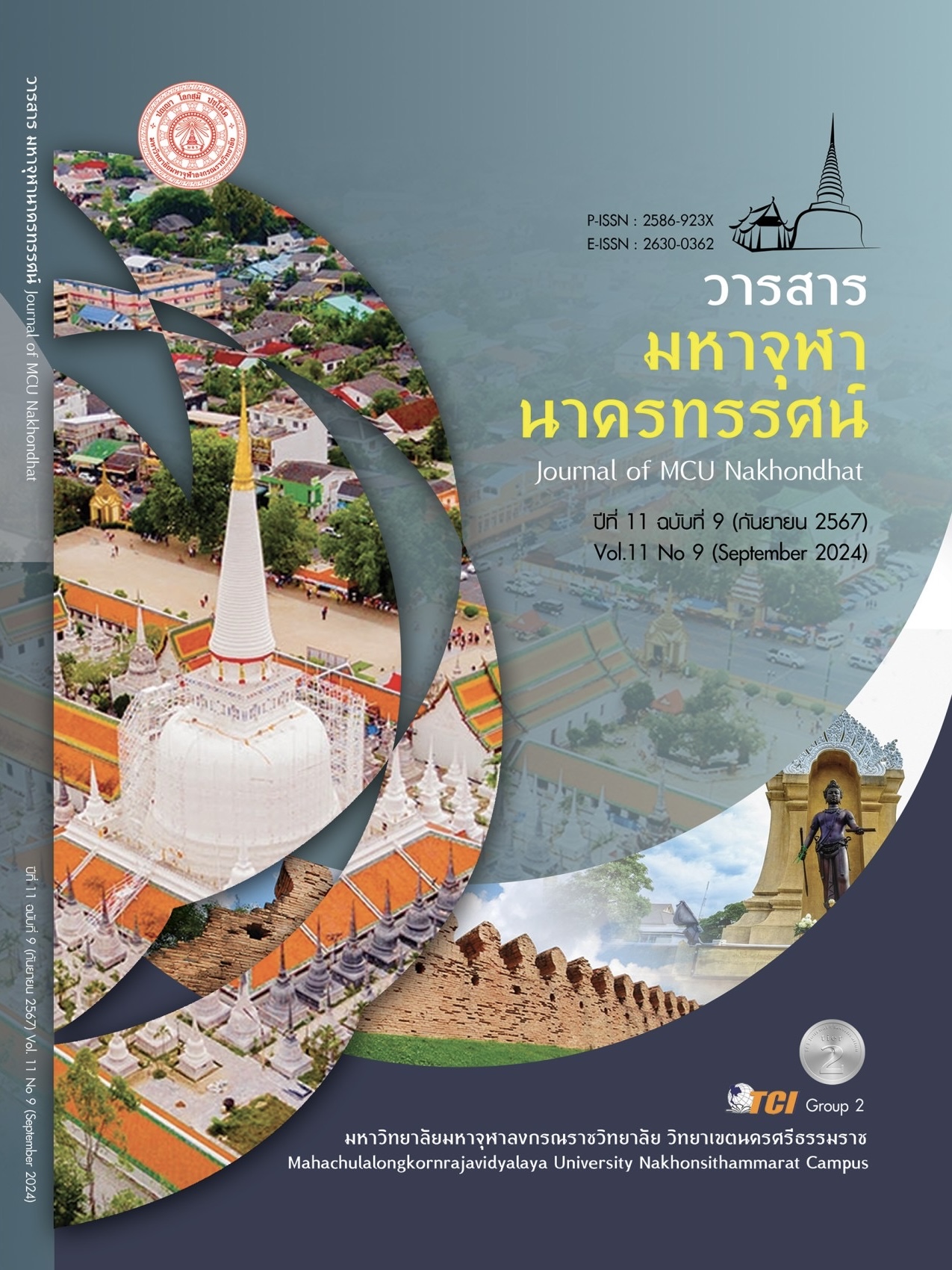THE MORAL COMMUNITY ADOPTS THE PHILOSOPHY OF SUFFICIENCY ECONOMY: CONTINUING WHAT FATHER TAUGHT
Main Article Content
Abstract
This academic article aims to study the virtuous community that applies the sufficiency economy philosophy to the community to create a virtuous community. The virtuous community of Wat Pradu is a virtuous community that is happy and good, has a good environment, and is ready to be a good host to share happiness and impress tourists and visitors like relatives. It is caused by the leaders of the Buddhist order as the core of development, with volunteers as the support and participation of everyone in the community, adhering to the principles of local community morality, with morality as the foundation, through group activities and the way of life of the people of Wat Sunthon Niwat community. These activities reflect the promotion of 5 virtues under the policy of moral reform, consisting of 1) Sufficiency, moderation in career, developing further by upgrading products, using knowledge in making decisions carefully, having moderation, not harming oneself, society, and the environment, creating good immunity, and being aware of changes. 2) Discipline, adhering to and taking responsibility for one's duties, both self-discipline, organizational discipline, society, and respecting the laws of the country. 3) Honesty, having integrity, honesty, and integrity, adhering to the principles of maintaining the truth, correctness, and fairness in all aspects. 4) Volunteerism, being someone who cares about the public society. and volunteering to do something that is not one's own duty with love and unity for the benefit of society and the country, without expecting anything in return, doing it until it becomes a habit. 5) Gratitude: expressing an appreciation for one's ancestors, parents, country, natural resources and the environment, creating it for living together in all genders, ages, religions, occupations and good environments.
Article Details

This work is licensed under a Creative Commons Attribution-NonCommercial-NoDerivatives 4.0 International License.
References
กรมการพัฒนาชุมชน. (2565). แนวทางส่งเสริมเศรษฐกิจพอเพียงในชุมชนสำหรับเจ้าหน้าที่พัฒนาชุมชน. กรุงเทพมหานคร: บางกอกบล็อก.
เกษม วัฒนชัย. (2559). การเรียนรู้ที่แท้และพอเพียง: แล้วเราจะเอาหลักไหนไปสู้ชีวิต. (พิมพ์ครั้งที่ 4). กรุงเทพมหานคร: สำนักพิมพ์มติชน.
นิธิ เอียวศรีวงศ์. (2560 ). วัฒนธรรมทางการเมืองไทย. กรุงเทพมหานคร: สถาบันพระปกเกล้า.
บุญเสริม บุญเจริญผล. (2558). แนวคิดเศรษฐกิจพอเพียง. วารสารวิชาการเศรษฐศาสตร์. มหาวิทยาลัยเกริก, 2(4), 13-24.
ประเวศ วะสี. (2557). เศรษฐกิจพอเพียงและประชาสังคม. กรุงเทพมหานคร: หมอชาวบ้าน.
ปรียานุช พิบูลสราวุธ. (2556). เศรษฐกิจพอเพียงและการประยุกต์ใช้ด้านการศึกษา. กรุงเทพมหานคร: โครงการวิจัยเศรษฐกิจพอเพียง.
ไพบูลย์ วัฒนศิริธรรม. (2556). ประชาคมตําบล: หมายเหตุจากนักคิด สถาบันชุมชนท้องถิ่นพัฒนา. กรุงเทพมหานคร: โอเดียนสโตร.
ยุงจิรายุ อุปเสน. (2557). การสร้างเป้าหมายตัวชี้วัดความสุขชุมชน. กรุงเทพมหานคร: มูลนิธิหัวใจอาสา.
ศูนย์โรงเรียนคุณธรรม มูลนิธิยุวสถิรคุณ. (2560). ชุมชนคุณธรรม. กรุงเทพมหานคร: บริษัท สหมิตรพริ้นติ้ง พับลิสซิ่ง จำกัด.
สำนักงานคณะกรรมการพัฒนาการเศรษฐกิจและสังคมแห่งชาติ. (2565). แผนพัฒนาเศรษฐกิจและสังคมแห่งชาติ ฉบับที่ 13 (พ.ศ. 2560-2570). กรุงเทพมหานคร: ศูนย์ประสานงานกลาง การดำเนินโครงการอันเนื่องมาจากพระราชดำริ.
สำนักงานประชาสัมพันธ์จังหวัดสุราษฎร์ธานี. (2566). โครงการชุมชนคุณธรรมต้นแบบ. สุราษฎร์ธานี: ฝ่ายประชาสัมพันธ์องค์การบริหารส่วนจังหวัดสุราษฎร์ธานี.
สุนัย เศรษฐ์บุญสร้าง. (2550). แนวทางปฏิบัติ 7 ขั้น สู่วิถีเศรษฐกิจพอเพียง: จากแนวปฏิบัติสู่แนวคิดทาง ทฤษฎีของเศรษฐกิจพอเพียง. กรุงเทพมหานคร: มูลนิธิวิธีสุข.
สุเมธ ตันติเวชกุล. (2554). การทรงงานพัฒนาประเทศของพระบาทสมเด็จพระเจ้าอยู่หัว. กรุงเทพมหานคร: สำนักงานคณะกรรมการพัฒนาการเศรษฐกิจและสังคมแห่งชาติ.
อาชว์ เตาลานนท์. (2550). ปรัชญาเศรษฐกิจพอเพียง Road to Sustainable Economy. กรุงเทพมหานคร: ห้างหุ้นส่วนจำกัด เม็ดทรายพริ้นติ้ง.


